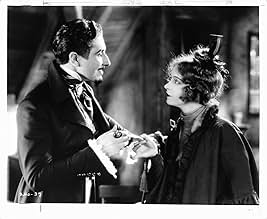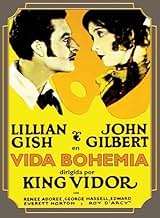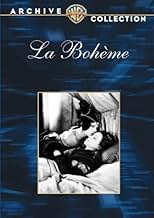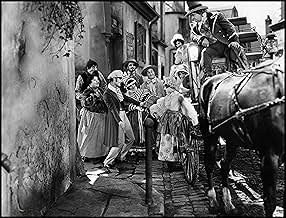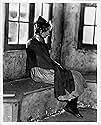IMDb RATING
7.2/10
1.8K
YOUR RATING
A group of starving artists try to survive in 1830s Paris, including a seamstress and the would-be playwright she loves.A group of starving artists try to survive in 1830s Paris, including a seamstress and the would-be playwright she loves.A group of starving artists try to survive in 1830s Paris, including a seamstress and the would-be playwright she loves.
- Awards
- 2 wins total
Mathilde Comont
- Madame Benoit
- (as Matilde Comont)
Eugene Pouyet
- Bernard
- (as Gene Pouyet)
Agostino Borgato
- Editor
- (uncredited)
Harry Crocker
- Bit Part
- (uncredited)
Blanche Payson
- Factory Supervisor
- (uncredited)
Featured reviews
It's difficult to imagine what going to the movies was like during the Silent Era. With no soundtracks, and a person in the theater simply accompanying the on-screen action on piano, dramas of the day must have suffered somewhat. But not 'La Boheme'.
As this wonderfully engaging tale of struggling actors and writers in France unfolds, it has a quality to its story telling that would have diminished had it been a talkie. Once you see the frail and beautiful (and quite haunting) Lillian Gish in her key scenes, you will never forget her.
Grab a few hankies and enjoy this singular silent screen treat!
As this wonderfully engaging tale of struggling actors and writers in France unfolds, it has a quality to its story telling that would have diminished had it been a talkie. Once you see the frail and beautiful (and quite haunting) Lillian Gish in her key scenes, you will never forget her.
Grab a few hankies and enjoy this singular silent screen treat!
In 19th century Bohemia, artistic residents in the "Latin Quarter" of Paris suffer and starve. Lillian Gish (as Mimi) is a seamstress who can't pay the rent. John Gilbert (as Rodolphe) is an playwright with money problems of his own. Gilbert has been watching Gish, who lives in the neighboring attic apartment; he is taken by her innocent waif-like beauty. On the first of the month, neither Ms. Gish nor Mr. Gilbert are able to pay the rent, when the landlord visits. Gilbert, his roommates, and friends get some cash together; but Gish, a loner, is evicted. As Gish is preparing to leave the building, Gilbert and friends rescue her from street life. Then, Gish and Gilbert fall in love.
The film is most notable for its outstanding pairing of stars Gish and Gilbert, under the star direction of King Vidor. Mr. Vidor is strangely subdued by the period, and settings; but, his Paris street scenes are terrific. The meeting of Gish and lecherous Roy D'Arcy (as Vicomte Paul) is striking; and, Gish's tubercular crawl through the streets of Paris is most especially stunning.
The lovers of "La Bohème" face poverty and misunderstanding; but, mainly, it's Gish's "Mimi" making sacrifices for Gilbert's "Rodolphe". Gish's performance is indescribable. According to Vidor and co-workers, she may have put her life in danger to make the film's ending most realistic; and, it shows. Gilbert is in fine form, and characterization; according to Gish, he proposed during film-making. Renée Adorée (as Musette) and Karl Dane (as Benoit) standout among the oddly more well-fed Bohemians.
King Vidor directing Lillian Gish and John Gilbert in a prestigious M-G-M production is, of course, well worth seeing; but, the sum of their efforts do not produce the portended masterpiece. Gish's performance seems too outer-worldly for the rest of the cast; and, the story is unworthy. Cinematographer Hendrik Sartov contributes to some beautiful imagery; although, his soft focus lens, on Gish close-ups, is distracting during the early scenes. Happily, Gish, and photographer Sartov, returned to balanced perfection, in "The Scarlet Letter" (1926).
******** La Boheme (2/24/26) King Vidor ~ Lillian Gish, John Gilbert, Renee Adoree, Roy D'Arcy
The film is most notable for its outstanding pairing of stars Gish and Gilbert, under the star direction of King Vidor. Mr. Vidor is strangely subdued by the period, and settings; but, his Paris street scenes are terrific. The meeting of Gish and lecherous Roy D'Arcy (as Vicomte Paul) is striking; and, Gish's tubercular crawl through the streets of Paris is most especially stunning.
The lovers of "La Bohème" face poverty and misunderstanding; but, mainly, it's Gish's "Mimi" making sacrifices for Gilbert's "Rodolphe". Gish's performance is indescribable. According to Vidor and co-workers, she may have put her life in danger to make the film's ending most realistic; and, it shows. Gilbert is in fine form, and characterization; according to Gish, he proposed during film-making. Renée Adorée (as Musette) and Karl Dane (as Benoit) standout among the oddly more well-fed Bohemians.
King Vidor directing Lillian Gish and John Gilbert in a prestigious M-G-M production is, of course, well worth seeing; but, the sum of their efforts do not produce the portended masterpiece. Gish's performance seems too outer-worldly for the rest of the cast; and, the story is unworthy. Cinematographer Hendrik Sartov contributes to some beautiful imagery; although, his soft focus lens, on Gish close-ups, is distracting during the early scenes. Happily, Gish, and photographer Sartov, returned to balanced perfection, in "The Scarlet Letter" (1926).
******** La Boheme (2/24/26) King Vidor ~ Lillian Gish, John Gilbert, Renee Adoree, Roy D'Arcy
NO, this silent Gish/Gilbert version of "La Boheme" is NOT BASED on the Puccini opera. Gish and the studio could not obtain the rights to the Puccini material. It IS based on Henry Murgi's 1851 novel "Life in the Latin Quarter." And once again IMDb insists I must pad out my comment to meet their silly minimum guidelines.
I do agree with other posters than you cannot view silent and sound films in the same way. No matter how great the performers involved, the 'mime' aspects seem very unnatural to modern eyes. You have to set aside prejudices on technique, especially if you are unused to viewing silent films, which can often seem melodrama and corny. I do enjoy watching Gish though.
I do agree with other posters than you cannot view silent and sound films in the same way. No matter how great the performers involved, the 'mime' aspects seem very unnatural to modern eyes. You have to set aside prejudices on technique, especially if you are unused to viewing silent films, which can often seem melodrama and corny. I do enjoy watching Gish though.
Lillian Gish is the main reason to watch this film, as the subtlety and range of her expressiveness is on full display here. She is simply magnificent. The film shows signs of creakiness and yet still carries an emotional impact, though I have to say, director King Vidor elongates things as he tries to wring every last ounce of pathos out of it. The film is also hampered by being silent, when you consider how powerful the music from Puccini's opera is.
Gish and John Gilbert were huge stars when this film was made, Gish especially, and there are moments when they light up the screen. My favorite is when they're out on a picnic and she dances about while he chases her. Look for the moment when he catches her, then holds her hands from behind and whispers something in her ear; her look of surprise changing to a backward glance as her body sways forward is wonderful. It's in these types of scenes and when the Vidor puts Gish's face in a tight shot that the film is at its best, and for them, it's worth watching.
Gish and John Gilbert were huge stars when this film was made, Gish especially, and there are moments when they light up the screen. My favorite is when they're out on a picnic and she dances about while he chases her. Look for the moment when he catches her, then holds her hands from behind and whispers something in her ear; her look of surprise changing to a backward glance as her body sways forward is wonderful. It's in these types of scenes and when the Vidor puts Gish's face in a tight shot that the film is at its best, and for them, it's worth watching.
La Boheme is a notoriously unreleased film that sometimes broadcasts on TCM. Thanks to a great cast featuring Lillian Gish, John Gilbert, and Renee Adoree, it is no wonder why fans clamor to see it. The star power indeed makes the film a good one. The story is one of sadness and heartbreak; two people live struggling to make ends meet in a shabby town in France. He is working as a writer, succumbing to pieces for the newspaper for money while he can flesh out his play. She is a seamstress whose love for him leads her to working herself to death. The love story is tragic and beautiful.
I have never understood the appeal of Gilbert, so I was not as interested in his character or, in consequence, the romantic relationship between he and Gish than I could have been. He is not a bad actor; I simply do not gravitate to his type. Gish is wonderful, however, as a pathetic but beautiful woman. One bright spot of this film was the couple's scenes on a picnic running through the wilderness in the sunlight.
I have never understood the appeal of Gilbert, so I was not as interested in his character or, in consequence, the romantic relationship between he and Gish than I could have been. He is not a bad actor; I simply do not gravitate to his type. Gish is wonderful, however, as a pathetic but beautiful woman. One bright spot of this film was the couple's scenes on a picnic running through the wilderness in the sunlight.
Did you know
- TriviaJohn Gilbert was infatuated with Lillian Gish and would mess up his "love scenes" with her on purpose, so he could keep kissing her.
- GoofsThe opening shot of Paris shows Notre Dame Cathedral with its famous spire. At the time the film is set, the 1830s, the spire did not exist. The original was demolished in the early 1790s and not rebuilt until 1860.
- Quotes
Title Card: Paris - Mother of the Arts...
- ConnectionsFeatured in American Masters: Lillian Gish: The Actor's Life for Me (1988)
Details
- Release date
- Country of origin
- Language
- Also known as
- La Boheme
- Filming locations
- Arcadia, California, USA(elaborate picnic in the woods of Ville-d'Avray)
- Production company
- See more company credits at IMDbPro
Box office
- Budget
- $693,000 (estimated)
- Runtime
- 1h 35m(95 min)
- Sound mix
- Aspect ratio
- 1.33 : 1
Contribute to this page
Suggest an edit or add missing content


